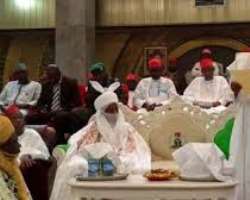Sanusi drops case against Jonathan

The Emir of Kano and former Governor of the Central Bank of Nigeria (CBN), Lamido Sanusi, has dropped the suit against the federal government challenging his suspension from office, as part of fence-mending overture to Preident Goodluck Jonathan.
The loquacious ex-CBN governor, who was elected as the new Emir of Kano, it was aslo learnt, is planning to the President following the overtures he had made to President personally and through intermediaries since his appointment as the emir, seeking Jonathan's forgiveness for his public utterances.
.
President Goodluck Jonathan had on February 20 suspended Mr. Sanusi from his position as governor of the CBN, citing financial recklessness.
Sanusi in a Notice of Discontinuance dated July 1, 2014, and filed same day, by his lawyers, informed the court of his intention to discontinue the matter.
Mr. Sanusi had headed for to the Federal High Court in Abuja challenging his suspension from office by president Goodluck Jonathan. Sanusi also joined the Attorney General and the Inspector General of Police in the suit.
However, the trial judge, Justice Gabriel Kolawole, had ruled that although Sanusi had an arguable case, the proper forum to ventilate his claim was before the National Industrial Court (NIC) and not the Federal High Court.
He held that the case bordered on industrial matters and could not be adjudicated upon by the high court. Justice Kolawole consequently transferred the case to the NIC.
In transferring the case, Justice Kolawole said in line with Sections 251 and 254 of the 1999 Constitution, the CBN was a creation of the National Assembly, and Sanusi was a public officer.
The judge further held that since Sanusi was an employee of the CBN by virtue of the CBN Act No 7 of 2007, he was a public servant whose appointment was a labour related matter that could be properly adjudicated upon by the industrial court.
Joined in the suit as defendants were President Goodluck Jonathan, the Attorney General of the Federation, and the Inspector General of Police.
However, the defendants were not satisfied with the refusal of the court to dismiss the case, they consequently lodged an appeal at the Court of Appeal in Abuja. Sanusi was also dissatisfied with the judgment and had also filed an appeal.
Both appeals were still pending as at the time Sanusi withdrew the case from the NIC.
In the suit, Sanusi had said the president had no power to suspend him as CBN governor and asked the court to reinstate him.
But at the last hearing of the lawsuit before the NIC, his lawyers had sought an adjournment to enable them consult with him in view of his new status as the Emir of Kano.
In their counter affidavit, the defendants had argued that the Federal High Court lacked jurisdiction in the matter since it was a labour-related suit that fell under the purview of the National Industrial Court.
In his ruling, Justice Gabriel Kolawole upheld the submissions of the counsel to the President, Fabian Ajogwu, and that of the Counsel to the Attorney General of the Federation, Mike Ozekhome.
Rather than dismiss the case outright, the court instead invoked section 24 of the National Industrial Court Act 2012 and ordered that the case be transferred to the National Industrial Court since the issues raised bothered on labour matters.
In transferring the case, Justice Kolawole said that in line with sections 251 and 254 of the 1999 constitution, the CBN was a creation of the National Assembly, and Mr. Sanusi was a public officer.
The Judge further held that since Mr. Sanusi was an employee of the CBN by virtue of the CBN Act No 7 of 2007, he was a public servant whose appointment was a labour related matter that could be properly adjudicated upon by the industrial court.
It was learnt that the Sanusi tempered manner towards the present started soon after he emerged the Emir of Kano.
He was said to have reached out to the President for forgiveness so he could gain access to his palace which was blocked by police.
